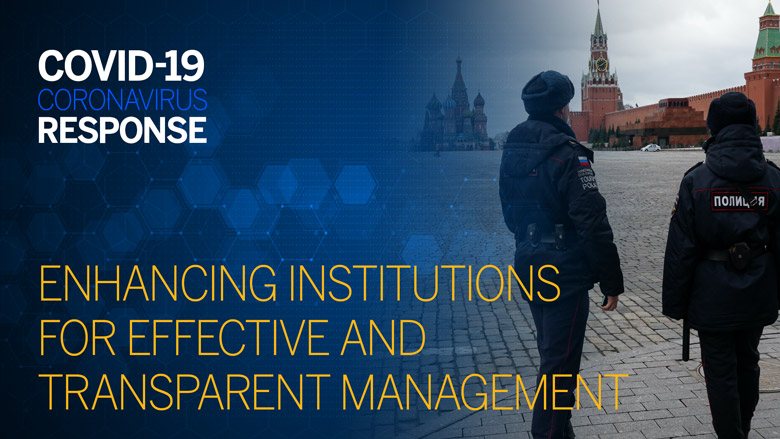
CHALLENGES
The COVID-19 pandemic has demonstrated the need for a strong and effective public sector, as governments are at the center of responding to the crisis. Public sector institutions are responsible for the provision of emergency services, the formulation of special responses (economic support packages, cash transfers, or other social safety nets), intergovernmental coordination (both vertically and horizontally), and the regulation of private sector agents. As such, they need to be fast, creative, effective, transparent, and accountable. However, the pandemic has exposed the limitations of government responses in both developed and developing countries due to inadequate risk management frameworks and weak, bureaucratic, unconnected, and unresponsive public sector institutions. This could have especially profound implications for the poorest and most vulnerable populations.
Governments need to ensure business continuity. Although governments must lead the response to the pandemic and other emergencies through fast and agile policy, coordination, funding, and implementation, they are also severely constrained, as social distancing prevents the public service from working at normal capacity. Thus, new processes and technologies, as well as selectivity to continue essential business operations, are required. The unusual circumstances lead to a shortened policy cycle without the information needed to make the right decisions, requiring a different way of managing that involves actions, feedback, learning, and adjustment.
Substantial emergency funds are being provided to buttress the health response and support individuals and firms adversely affected by the crisis. The creation of special, expedited measures speeds up the release of funds, but these measures can also lead to additional strains associated with recording financial transactions and ensuring adequate oversight to maintain standard procedures. This situation can create opportunities for the misuse of funds and increase the risk of corruption. Such risks could range from rushed contracts being awarded to favored companies to theft and capture in the allocation and use of emergency funds. Equally important is ensuring that public resources are put to good use in an accountable and transparent manner.
WHAT RUSSIA HAS DONE TO CONFRONT THESE CHALLENGES
Nationwide lockdown
On March 27, President Vladimir Putin declared a week-long nationwide lockdown from March 28 to April 5. Since March 28, restrictive measures have been introduced throughout Russia: cafes, shopping and entertainment centers, and cinemas have been closed, public transport has stopped working in some regions, and people have been prohibited from assembling in religious institutions.
Support measures for businesses and individuals
While encouraging regional governments to do more to manage the outbreak locally, the federal government has also taken steps to ameliorate the economic consequences of the pandemic, including boosting pay for medical workers, eliminating import duties on “socially important goods,” helping businesses restructure loans, creating tax deferments for small and medium enterprises (SMEs), setting up payments to families with children under four for three months (US$63 monthly for each child), increasing maternity funds for eligible families, automatically extending social welfare payments and benefits for six months without the need to confirm eligibility, raising unemployment payments to equal the minimum wage, and others. The government’s anti-crisis measures adopted to date amount to around 3,231 bln Rubles or approximately 2.9 percent of GDP. Additional measures were introduced in April, and regional governors have been given a mandate to introduce their own actions.
WHAT ARE OTHER COUNTRIES DOING?
Other countries (including South Korea, New Zealand, Australia, and members of the European Union) have taken several initiatives to ensure: (i) state continuity and resilience during and after the COVID-19 pandemic to be better prepared in the future, and (ii) the effective and transparent use of public resources associated with response and recovery efforts.
Ensuring state continuity and resilience during and after the pandemic. Activities to ensure business continuity in Organisation for Economic Co-operation and Development (OECD) member countries like Germany, Canada, and Australia include: (i) establishing cross-government crisis management coordination mechanisms; (ii) improving access to critical information (health data, funding, emergency procedures); (iii) adopting information technology tools to ensure business continuity; and (iv) streamlining fiscal transfer procedures to subnational governments and promoting communication strategies.
GovTech’s contribution to building resilience against a viral contagion risk. In 2015, South Korea’s Board of Inspection and Audit (BAI) conducted an audit of the government’s response to the outbreak of MERS (Middle East Respiratory Syndrome). This audit found weaknesses in the response, including a lack of transparency and training on early detection, as well as inadequate coordination and communication among authorities. The government and parliament acted quickly to address these weaknesses so that the country would be much better prepared for future pandemics. The responses in South Korea have included: (i) introducing cost-effective connectivity solutions for government operation and service delivery; (ii) automating functions to reduce in-person exchanges of information and decisions deliberations; (iii) increasing digitization across recalcitrant functions of government; (iv) investing in data to create an “observatory” for national and international health patterns; and (v) building spatial distancing into core public sector functions.
Effective and transparent use of public resources. A growing number of countries are deferring tax payments, including social contributions and even penalties, for businesses (e.g., Austria, Australia, Canada, Colombia, Ireland, South Korea, Peru, Poland, and Vietnam). In some cases (Colombia, Korea, and Vietnam), the focus is on deferrals for affected sectors (e.g., hospitality and aviation in Colombia). OECD countries have introduced: (i) building flexible but accountable treasury mechanisms such as contingency funds; (ii) enhancing daily cash flow forecasting and monitoring; (iii) implementing electronic payments and increasing digital channels for tax payments and services; (iv) reducing the administrative burden, with a focus on the most affected sectors; (v) reforming civil service rules to incorporate home-based work, wage subsidies, and flexible deployment in crisis situations; (vi) reforming administrative procedures to make them more agile; and (vii) building a digital workforce.
Minimizing fraud and corruption. In the midst of COVID-19, the Kuwait State Audit Bureau has been performing a real-time audit as part of its ex-ante audit mandate. They have audited over US$650 million worth of pandemic-related contracts thus far and saved approximately US$7 million. Other Supreme Audit Institutions (SAIs) can contribute in the same way by performing a real-time audit to minimize fraud and corruption or post-crisis audits when countries face economic recession. SAIs need to continue monitoring to ensure that public funds and public services are delivered properly. However, they face many challenges, including limited accessibility to auditees, technology infrastructure, and connections to perform remote audits, along with high expectations from key stakeholders on the audits’ quality and timeliness.
WHAT MORE COULD BE DONE?
Inter-Governmental Coordination
The vertical and horizontal coordination of government actions and functions is particularly critical during times of crisis. Governments are exposed to unprecedented business disruptions at varying levels, and in the absence of pre-established rules, procedures, and protocols to deal with such disruptions, they need to develop business continuity assessments and plans. In addition, health systems are often highly decentralized, and crisis response is a shared function with subnational governments.
GovTech for the continuity, efficiency, and transparency of services
Although offices may be closed, countries are using digital technology to manage government and maintain service availability, and some leading countries are quickly deploying new solutions. These include service platforms, cloud-based core government systems and functions (e.g., e-Cabinet, e-Parliament, etc.), and citizen engagement mechanisms, ranging from SMS push alerts to voice response systems that allow citizens to obtain information on the virus and report symptoms and the need for testing or assistance. The South Korean experience in GovTech is highly relevant for Russia and the country may want to set up effective digital systems into core public sector functions. with focus on cost-effective connectivity solutions for government operations and service delivery reducing in-person exchanges of information and decisions deliberations.
Effective public resource management
Public financial management (PFM) systems need rapid adjustments to their processes, procedures, and control mechanisms to ensure the rapid disbursement of resources both to the service delivery units and to the beneficiaries of the fiscal stimulus packages for affected businesses and households. With the debt relief initiative, it will be even more important for PFM systems to ensure that the pandemic response expenditures are pro-poor. Tax systems can play a key role in easing the cash burden on the most severely affected businesses and individuals.
At the same time, domestic resource mobilization needs to continue, to the extent possible, with minimal disruptions to fund essential public service delivery. As with all public services, tax services should be moved online where possible to reduce physical contact and limit transmission risks. The key focus is on expanding the fiscal space while protecting the poor.
RISKS AND PITFALLS TO AVOID
Keeping a medium-term perspective on governance and institutions
Governments need to effectively deal with the current pandemic, including by implementing a range of responses to support health, households, and firms. Despite sharp declines in revenues, key government services need to be maintained. This refers to core functions, such as the management and provision of basic services; budget, procurement, and treasury operations; the deployment of public servants; and intergovernmental transfers, among others. As the crisis settles, governments will need to focus on the recovery phase and ensure the resilience of public service delivery. Furthermore, the public sector needs to be supported to become more resilient to deal with future events, as the current crisis has shown that state continuity cannot be guaranteed in all situations if the public sector is not modernized. A governance and institutional response should consist of activities for both short- and medium-term horizons, including: (1) enhance core government functions; (2) enable universal access to public services through GovTech; (3) tackle corruption and tax evasion to reduce illicit financial flows; and (4) support multi-stakeholder approaches to policy making and implementation.
Strengthening transparency and accountability as part of the crisis response
As institutions are inevitably reshaped, there is a need to avoid endangering fundamental governance principles and norms. There are significant corruption risks that can undermine the effectiveness of emergency responses and create or exacerbate adverse outcomes. If left unaddressed, these can lead to excessive waste, inefficiency, and weak results. Strengthening transparency and accountability is important to build trust and mitigate corruption risks. Building and sustaining citizen trust is critical if governments are to manage the crisis and increase the effectiveness of their actions and measures. Potential activities include:
- Ensuring the unambiguous assignment of responsibility for the oversight of both extraordinary spending measures and the supply and delivery of goods and services
- Building transparency and anticorruption measures into each category of the crisis response
- Promoting transparent procurement (including e-Procurement systems) to ensure value-for-money in public spending
- Implementing systems and controls for the traceability of emergency and recovery expenditures
- Establishing rules regarding the timing and format of publishing information on spending
- Enhancing debt transparency and specifying extraordinary audit and supervision provisions, including adapting SAI auditing plans to focus on emergency-related expenditures
- Providing key information to citizens regularly
SAIs can play an important role in minimizing fraud and corruption
SAIs can contribute to the current situation by performing a real-time audit to minimize fraud and corruption or post-crisis audits when countries face economic recession. SAIs need to continue monitoring to ensure that public funds and public services are delivered properly. However, they face many challenges, including limited accessibility to auditees, technology infrastructure, and connections to perform remote audits, along with high expectations from key stakeholders on the audits’ quality and timeliness.
Last Updated: Jun 05, 2020
MULTIMEDIA
Expert Answers: How Can We Help Countries Dealing with Coronavirus?
Experts
Renaud Seligmann
Director for Strategy and Operations, Planet Vice Presidency
